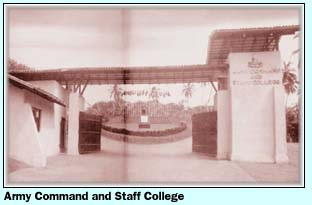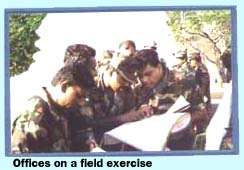 |
 21st March 1999 |
Front Page| |
 Making majors |
Contents
|
|
 |
Now affiliated to the Kelaniya University, the Army Command and Staff College at Sapugaskanda aims at training officers for higher command
Making majorsBy Hiranthi Fernando"To war with wisdom and knowledge," reads the motto of the Army Command and Staff College (ACSC). Its crest, the wise old owl, stands sentinel at the entrance, perched on a pair of crossed swords.A colourful array of flags representing the College, the Army and all its regiments, flutters gently in the breeze. In this well-maintained complex at Sapugaskanda, surrounded by tranquil paddy fields, selected officers of the Sri Lanka Army are trained in preparation for their appointments as Majors and Lieutenant Colonels. In a professional army, there is a continuous need for trained officers to ensure efficient performance. Faced with a war for the last 15 years, the Sri Lanka Army has increased in strength, but lost many able officers in battle. There is an increasing need for well trained officers to take over the functions of command and staff. Thus the inauguration of the Army Command and Staff College (ACSC) in Sri Lanka last year. Just granted affiliation to the University of Kelaniya, the officers who pass out from ACSC, will now be awarded a Masters Degree in Defence Studies from the University. "The inaugural course started on March 16, last year, although the ACSC was officially declared open by the President on August 28,'98," Major General Anton Wijendra, Commandant of the College said. The chief architect of the project was Lt. General Rohan Daluwatte, the Commander of the Army.Maj. Gen. Wijendra was appointed in August 1997 and assigned the task of establishing the College. "The staff course is a mid-career course. We were sending officers for training to Staff Colleges in India, Pakistan, Bangladesh, U.K. and U.S.A. However, we only had an average of three courses an year given to us on a scholarship basis by these colleges. We could not afford these courses as they were costly. So there was an urgent need to establish a training college for officers in Sri Lanka," Gen. Wijendra said. Recalling the early days of the project., the Commandant said the 23 acre complex, abandoned by the State Fertilizer Corporation at Sapugaskanda, had been bought by the Army to set up the Staff College. "It was in a terrible state. Some buildings had collapsed and the rest were in bad condition. We had to start from scratch. The reconstruction was handled by the Army Engineers," he said. Maj. Gen. Wijendra said a team from the British Army had helped in the preparation of course material. "We drew up a course package to suit our requirements," the Commandant said. The liaison continues with the British army. Col. John Field of the British Army was assigned as the British Military Advisor Training (BMAT) to the ACSC. On his departure, Lt. Col. Brian Martin was appointed as the British Army Training Liaison Officer (BATLO), and is due to take up residence at the college soon. The ACSC, is an impressive complex. A large expanse of well tended lawn is surrounded by the buildings, the residential quarters separate from the administrative and working areas. Military personnel, as well as some civilian cooks, gardeners and office staff are employed to administer and maintain the college. The first batch of officers graduated in December last year and the second course is now in progress. "Though the course is meant for the Army, we invite officers from the Navy and the Air Force to participate," Maj. Gen. Wijendra said. "The aim of the ACSC is to develop the professional knowledge and understanding of selected officers." The extensive course curriculum covers a wide range of subjects, classed into 23 groups. Apart from Military Studies, subjects such as Management, International Affairs, Administrative Studies, Ethics, Sri Lankan Studies and Technology are included. Computer awareness is taught at the orientation programme. In addition to eight Military Instructors or Directing Staff, eminent visiting lecturers are also brought in. Explaining the teaching methodology, the Commandant said the students are first issued with a Student Preparation Guide (SPG).Then a presentation on the subject will be given by an instructor.The students are then divided into syndicate groups. In the Syndicate Room the topic is discussed in depth with students encouraged to think independently.
The day we visited ACSC, the students of all three syndicate groups were concentrating on the first RIC of the course. "The exercise today, is to write a brief," said Col. Lankadeva who was conducting the RIC. "We have given them a collection of necessary articles and correspondence on Career Planning for Officers in the Army. Assuming that the Commander has to go on a visit, the Staff Officer needs to prepare a brief for his information. It should stand on its own with relevant references given under flags." For the Commandant's Paper which is compulsory, students are given a list of topics to select from. Independent research has to be conducted and a thesis submitted. War games play an important part in training at the Staff College. They cover a variety of formations and model tactical and operational level conflicts. War games include discussion games, telephone battles, map exercises and exercises on sand models. A war scenario is played by two teams. Students take on the roles of commander while Directing Staff watch and assess. A war game, named Golden Shield, was a five day exercise at Dambulla. Various other indoor and outdoor exercises are included in the course curriculum at ACSC. Visits to the Ports Authority, the Armoured Regiment and Dockyard at Trincomalee, the Board of Investment and Free Trade Zone factories, to give them exposure to trade, are included in the course. The officer students are expected to live in the complex. Facilities for tennis, basketball, table tennis and a mini gymnasium as well as the swimming pool, are available on the premises. In addition, the students are taken to the Sugathadasa Stadium for physical fitness exercises. Social events also play a part in the college programme. The participation of the families is encouraged. An elegantly furbished Officers Mess with a swimming pool and an adjoining section for the ladies provides an ideal venue for social functions. At Guest Nights, officers, clad in full regalia sit down to a formal dinner together with their wives. A Ladies Club formed by the officers' wives also organises programmes for the families. On completion of the course, a Graduation ceremony is held. Officers who obtain over 70% come on the Commandant's Honours List. The ACSC is a stepping stone to higher command.
More Plus * Kala Korner By Dee Cee * Nirmali launches her first novel
Front Page| News/Comment| Editorial/Opinion| Business| Sports | Mirror Magazine |
|
 |
Please send your comments and suggestions on this web site to |
|
 The
syndicate discussion is followed by a map exercise in the classroom and
a field exercise. A Red Ink Correction (RIC) which is in the form of a
written test is then conducted to assess their knowledge.
The
syndicate discussion is followed by a map exercise in the classroom and
a field exercise. A Red Ink Correction (RIC) which is in the form of a
written test is then conducted to assess their knowledge.